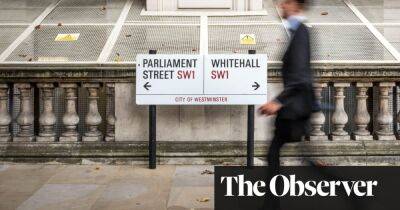The Guardian view on overriding the Brexit treaty: a national disgrace
There is no good reason for the UK to sabotage relations with its European neighbours, but doing it to score ideological points with a small faction of the prime minister’s supporters is exceptionally poor judgment. Yet that is what Boris Johnson intends to do with legislation, now said to be due for publication next week, to override the Northern Ireland protocol of the Brexit deal he signed in 2019.
The ostensible trigger is the collapse of power-sharing at Stormont, caused by the Democratic Unionist party’s refusal to form an administration with Sinn Féin. The DUP objects to the basis of the protocol – the requirement for customs checks on goods crossing the Irish Sea – and wants it rewritten. The EU offers modifications in the way that the treaty is implemented, saying checks are necessary to prevent Northern Ireland becoming an unregulated backdoor into the single market.
Mr Johnson accepted the Brussels view when he did the deal, then changed his tune. He is now equivocating between different degrees of diplomatic vandalism. Tory hardliners, represented in cabinet by Liz Truss, the foreign secretary, envisage a law that would strike the protocol down. A less extreme variant would create an override mechanism, but keep it in reserve, pending the outcome of negotiations in Brussels. The DUP prefers the more drastic option, fearing that powers in reserve would stay unused. Either version would be an affront to international law and a stain on the UK’s credentials as a practitioner of responsible statecraft. Unsurprisingly, the EU is becoming less willing to compromise.
The practical problems caused by Irish Sea customs checks are overstated. Businesses are adapting. Data published by the Office for National Statistics
Read more on theguardian.com


![Ethereum [ETH]: Analyzing how this resistance level can furnish an opportunity for investors - ambcrypto.com](https://finance-news.co/storage/thumbs_400/img/2022/7/8/32746_bsrc.jpg)







![Has Binance Coin [BNB] hit a brick wall after gaining 17% within eight days? - ambcrypto.com](https://finance-news.co/storage/thumbs_400/img/2022/7/8/32737_l0us.jpg)









